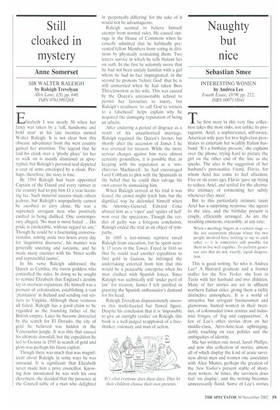Still cloaked in mystery
Anne Somerset
SIR WALTER RALEIGH by Raleigh Trevelyan Allen Lane, £20, pp. 640, ISBN 0761399326X Elizabeth I was nearly 50 when her fancy was taken by a 'tall, handsome and bold man in his late twenties named Walter Raleigh. It is not clear how this obscure adventurer from the west country gained her attention. The legend that he laid his cloak over a `plashy place' for her to walk on is usually dismissed as apocryphal, but Raleigh's personal seal depicted a coat of arms enveloped by a cloak. Perhaps, therefore, the story is true.
By 1584 Raleigh had been appointed Captain of the Guard and every vintner in the country had to pay him £1 a year licensing fee. Such material success made others jealous, but Raleigh's unpopularity cannot be ascribed to envy alone. He was a supremely arrogant man who positively exulted in being disliked. One contemporary alleged, No man is more hated ... His pride is intolerable, without regard to any.' Though he could be a fascinating conversationalist, setting aside two hours every day for 'inquisitive discourse', his manner was generally sneering and sarcastic, and he made many enemies with his 'bitter scoffs and reproachful taunts'.
In his verse Raleigh addressed the Queen as Cynthia, the moon goddess who controlled the tides. In doing so he sought to remind Elizabeth that England's destiny lay in overseas expansion. He himself was a pioneer of colonisation, establishing a vast 'plantation' in Ireland and sending out settlers to Virginia. Although these ventures all failed, Raleigh has a good claim to be regarded as the founding father of the British empire. Later he became distracted by the search for El Dorado, the city of gold he believed was hidden in the Venezuelan jungle. It was this that caused his ultimate downfall, but the expedition he led to Guiana in 1595 in search of gold and glory was perhaps his finest exploit.
Though there was much that was magnificent about Raleigh, in some ways he was unsound. It is significant that Elizabeth never made him a privy councillor. Knowing how intoxicated he was with his Own cleverness, she decided that the presence at the Council table of a man who delighted in perpetually differing' for the sake of it would not be advantageous.
Raleigh seemed to believe himself exempt from normal rules. He caused outrage in the House of Commons when he casually admitted that he habitually prevented fellow Members from voting in divisions by physically restraining them, Two letters survive in which he tells blatant lies on oath. In the first he solemnly swore that he had not been unduly familiar with a girl whom he had in fact impregnated; in the second he protests 'before God' that he is still unmarried when he had taken Bess Throckrnorton as his wife. This was caused by the Queen's unreasonable refusal to permit her favourites to marry, but Raleigh's readiness 'to call God to witness to a falsehood' helps explain why he acquired the damaging reputation of being an atheist.
After enduring a period of disgrace as a result of his unauthorised marriage, Raleigh regained the Queen's favour, but shortly after the accession of James I he was arrested for treason. While the more serious charges against him were almost certainly groundless, it is possible that, in keeping with his reputation as a 'mischievous Machiavell', he had encouraged Lord Cobham to plot with the Spaniards in the belief that he could then salvage his own career by unmasking him.
When Raleigh arrived at his trial it was feared the crowd might lynch him, but the dignified way he defended himself when the Attorney-General, Edward Coke abused him as a 'viper' and 'spider of hell' won over the spectators. Though the verdict of guilty was a foregone conclusion, Raleigh ended the trial as an object of sympathy.
In 1603 a last-minute reprieve saved Raleigh from execution, hut he spent nearly 13 years in the Tower. Freed in 1616 so that he could lead another expedition to find gold in Guiana, he infringed the undertaking extorted from him that this would he a peaceable enterprise when his men clashed with Spanish forces. Since Raleigh was technically still 'under peril of law' for treason, James I felt justified in granting the Spanish ambassador's demand for his head.
Raleigh Trevelyan dispassionately assesses this multi-faceted but flawed figure. Despite his conclusion that it is 'impossible to give an outright verdict' on Raleigh, this book is a well-judged reappraisal of a freethinker, visionary and man of action.


























































































 Previous page
Previous page